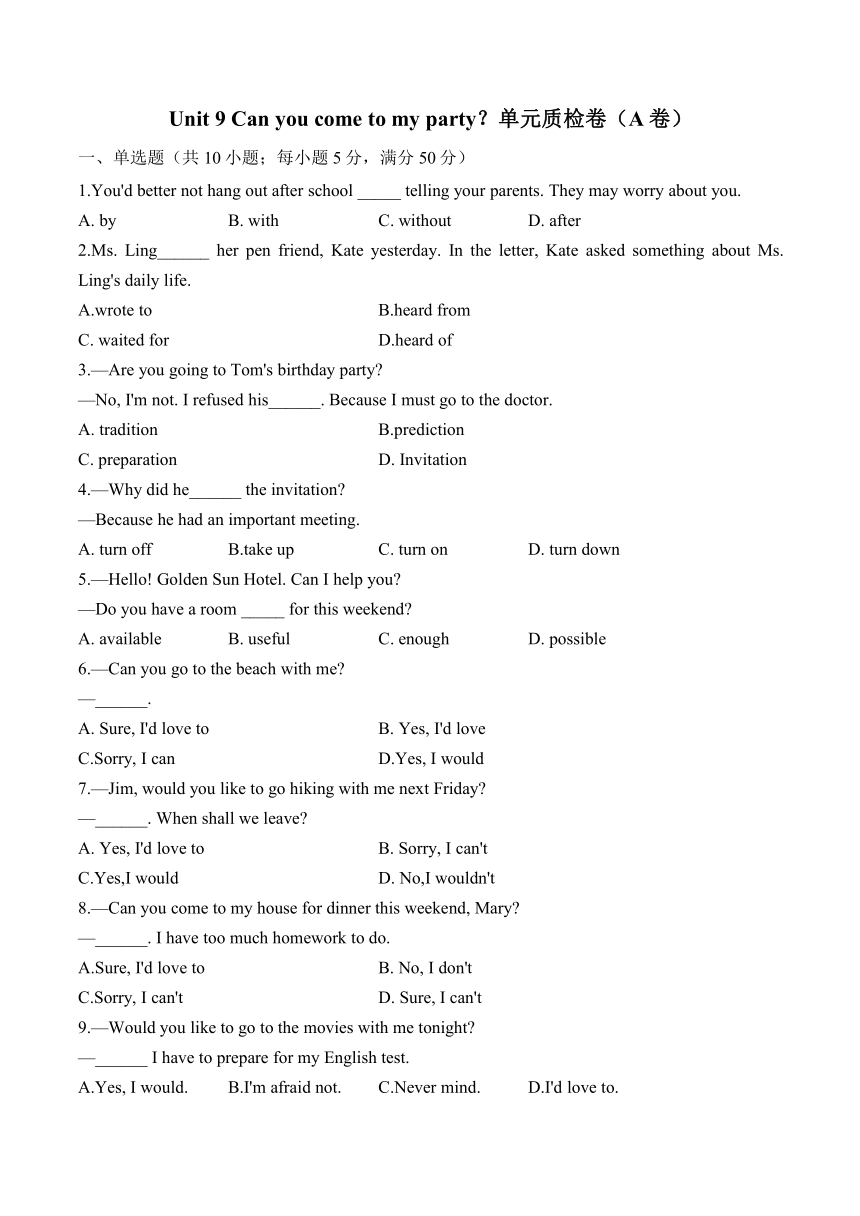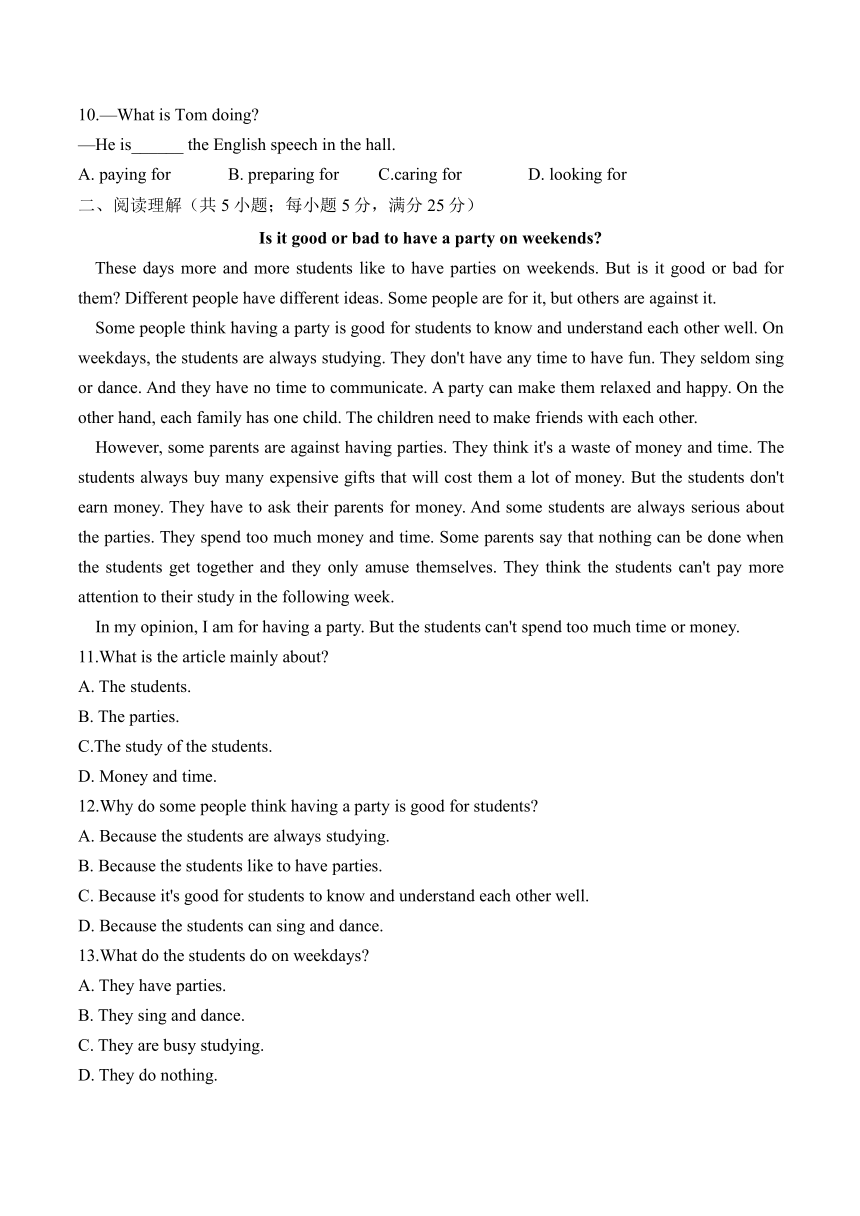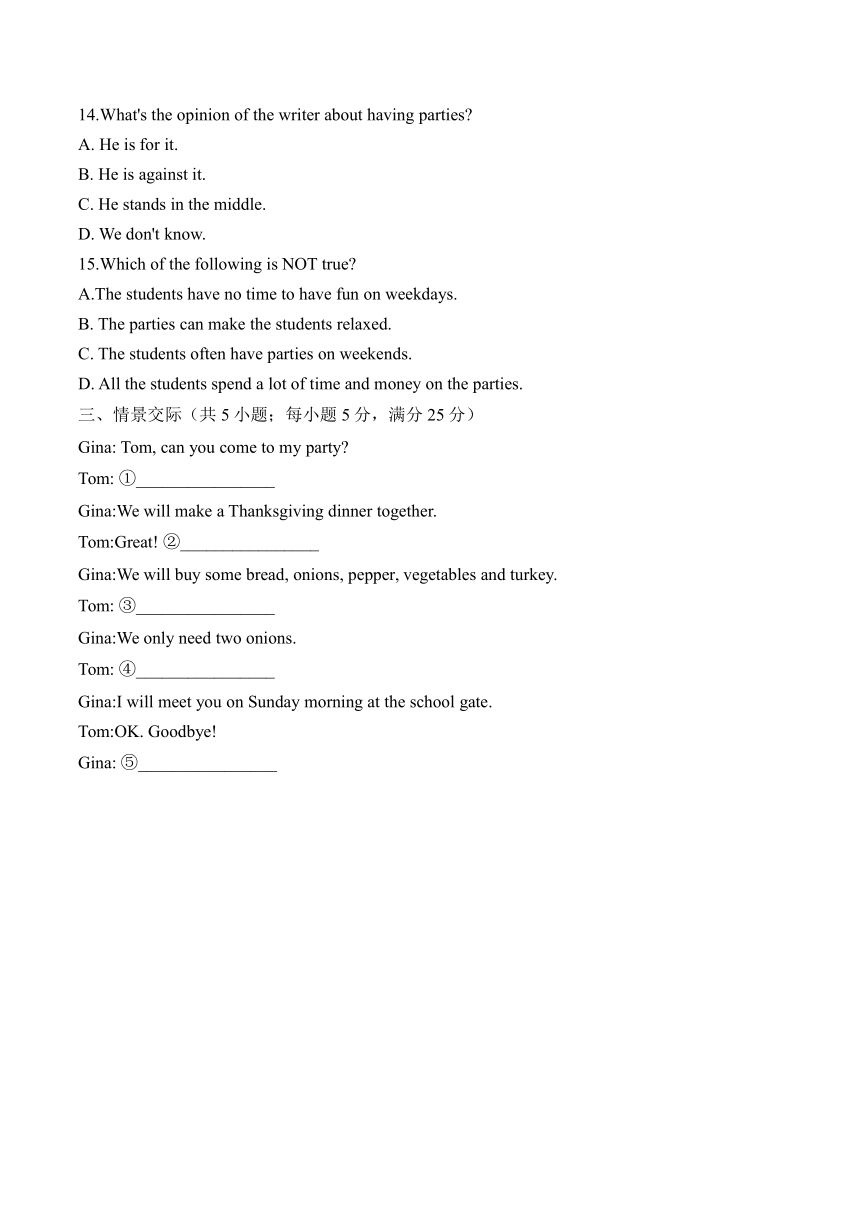Unit9 Can you come to my party?单元质检卷(A卷,含答案)人教版八年级上册
文档属性
| 名称 | Unit9 Can you come to my party?单元质检卷(A卷,含答案)人教版八年级上册 |

|
|
| 格式 | docx | ||
| 文件大小 | 17.8KB | ||
| 资源类型 | 教案 | ||
| 版本资源 | 人教新目标(Go for it)版 | ||
| 科目 | 英语 | ||
| 更新时间 | 2024-11-28 00:00:00 | ||
图片预览



文档简介
Unit 9 Can you come to my party?单元质检卷(A卷)
一、单选题(共10小题;每小题5分,满分50分)
1.You'd better not hang out after school _____ telling your parents. They may worry about you.
A. by B. with C. without D. after
2.Ms. Ling______ her pen friend, Kate yesterday. In the letter, Kate asked something about Ms. Ling's daily life.
A.wrote to B.heard from
C. waited for D.heard of
3.—Are you going to Tom's birthday party
—No, I'm not. I refused his______. Because I must go to the doctor.
A. tradition B.prediction
C. preparation D. Invitation
4.—Why did he______ the invitation
—Because he had an important meeting.
A. turn off B.take up C. turn on D. turn down
5.—Hello! Golden Sun Hotel. Can I help you
—Do you have a room _____ for this weekend
A. available B. useful C. enough D. possible
6.—Can you go to the beach with me
—______.
A. Sure, I'd love to B. Yes, I'd love
C.Sorry, I can D.Yes, I would
7.—Jim, would you like to go hiking with me next Friday
—______. When shall we leave
A. Yes, I'd love to B. Sorry, I can't
C.Yes,I would D. No,I wouldn't
8.—Can you come to my house for dinner this weekend, Mary
—______. I have too much homework to do.
A.Sure, I'd love to B. No, I don't
C.Sorry, I can't D. Sure, I can't
9.—Would you like to go to the movies with me tonight
—______ I have to prepare for my English test.
A.Yes, I would. B.I'm afraid not. C.Never mind. D.I'd love to.
10.—What is Tom doing
—He is______ the English speech in the hall.
A. paying for B. preparing for C.caring for D. looking for
二、阅读理解(共5小题;每小题5分,满分25分)
Is it good or bad to have a party on weekends
These days more and more students like to have parties on weekends. But is it good or bad for them Different people have different ideas. Some people are for it, but others are against it.
Some people think having a party is good for students to know and understand each other well. On weekdays, the students are always studying. They don't have any time to have fun. They seldom sing or dance. And they have no time to communicate. A party can make them relaxed and happy. On the other hand, each family has one child. The children need to make friends with each other.
However, some parents are against having parties. They think it's a waste of money and time. The students always buy many expensive gifts that will cost them a lot of money. But the students don't earn money. They have to ask their parents for money. And some students are always serious about the parties. They spend too much money and time. Some parents say that nothing can be done when the students get together and they only amuse themselves. They think the students can't pay more attention to their study in the following week.
In my opinion, I am for having a party. But the students can't spend too much time or money.
11.What is the article mainly about
A. The students.
B. The parties.
C.The study of the students.
D. Money and time.
12.Why do some people think having a party is good for students
A. Because the students are always studying.
B. Because the students like to have parties.
C. Because it's good for students to know and understand each other well.
D. Because the students can sing and dance.
13.What do the students do on weekdays
A. They have parties.
B. They sing and dance.
C. They are busy studying.
D. They do nothing.
14.What's the opinion of the writer about having parties
A. He is for it.
B. He is against it.
C. He stands in the middle.
D. We don't know.
15.Which of the following is NOT true
A.The students have no time to have fun on weekdays.
B. The parties can make the students relaxed.
C. The students often have parties on weekends.
D. All the students spend a lot of time and money on the parties.
三、情景交际(共5小题;每小题5分,满分25分)
Gina: Tom, can you come to my party
Tom: ①________________
Gina:We will make a Thanksgiving dinner together.
Tom:Great! ②________________
Gina:We will buy some bread, onions, pepper, vegetables and turkey.
Tom: ③________________
Gina:We only need two onions.
Tom: ④________________
Gina:I will meet you on Sunday morning at the school gate.
Tom:OK. Goodbye!
Gina: ⑤________________
答案以及解析
一、单选题
1.答案:C
解析:by意为“通过”; with意为“和”; without意为“没有”; after意为“在……之后”。此处表示在没有告诉父母的情况下,故选C项。
2.答案:B
解析:write to 意为“给……写信”;hear from 意为“收到……的来信”;wait for意为“等待”;hear of 意为“听说”。结合语境,故选B 项。
3.答案:D
解析:tradition 意为“传统”;prediction 意为“预言;预测”;preparation意为“准备”;invitation意为“邀请”。结合语境,故选D项。
4.答案:D
解析:根据"Because he had an important meeting."可知此处询问拒绝邀请的原因,故选D项。
5.答案:A
解析:available意为“可获得的; 有空的”; useful意为“有用的”; enough意为“足够的”:possible意为“可能的”。根据语境可知此处询问这周末是否有空房。故选A项。
6.答案:A
解析:句意为:—你能和我一起去海滩吗 —当然,我很乐意。此处的"Can you… "句型表示请求,其肯定回答为"Sure, I'd love to.",否定回答为"Sorry, I can't."。故选A项。
7.答案:A
解析:由空后一句可知此处应用肯定回答,would you like to do sth.的肯定回答常用"Yes, I'd like/love to.",故选A项。
8.答案:C
解析:根据"I have too much homework to do."可知玛丽去不了,根据问句中的Can 可知回答应用can't。
9.答案:B
解析:本题考查交际用语。问句中提出邀请,根据答语中的"I have to prepare for my English test"可知答话人去不了,故B项“我恐怕去不了”符合题意。
10.答案:B
解析:句意为:—汤姆正在干什么 —他正在大厅里准备英语演讲。pay for 意为“为……付款”;prepare for意为“为……做准备”;care for意为“关心;照顾”;look for意为“寻找”。根据句意,故选B项。
二、阅读理解
11.答案:B
解析:主旨大意题。根据本文标题以及全文内容可知本文主要介绍了人们对于学生举办周末聚会的态度,故选B项。
12.答案:C
解析:细节理解题。根据第二段的第一句可知选C项。
13.答案:C
解析:细节理解题。根据第二段中的"On weekdays, the students are always studying."可知选C项。
14.答案:A
解析:细节理解题。根据第四段中的"In my opinion, I am for having a party."可知作者支持聚会,故选A项。
15.答案:D
解析:细节理解题。根据第三段中的"And some students are always serious about the parties. They spend too much money and time."可知并不是所有学生有此行为,D项错误。
三、情景交际
答案:①Yes, I'd love to./Yes, I can./Yes.
②What will you/we buy
③How many onions do you/we need /How many onions
④When and where will we meet
⑤Goodbye./See you.
解析:①上句是一般疑问句表示邀请;根据后文吉娜不断介绍派对内容及要准备的事情等可知,汤姆同意参加派对。
②根据下文“We will buy some bread, onions, pepper, vegetables and turkey.”可知,此处应提问“要买什么?”。
③根据下文“We only need two onions.”可知,此处应提问“需要多少洋葱?”。
④根据下文“I will meet you on Sunday morning at the school gate.”可知,此处应提问“什么时间,在哪里见面?”。
⑤根据上文“OK. Goodbye!”可知,此处应说“再见”。
一、单选题(共10小题;每小题5分,满分50分)
1.You'd better not hang out after school _____ telling your parents. They may worry about you.
A. by B. with C. without D. after
2.Ms. Ling______ her pen friend, Kate yesterday. In the letter, Kate asked something about Ms. Ling's daily life.
A.wrote to B.heard from
C. waited for D.heard of
3.—Are you going to Tom's birthday party
—No, I'm not. I refused his______. Because I must go to the doctor.
A. tradition B.prediction
C. preparation D. Invitation
4.—Why did he______ the invitation
—Because he had an important meeting.
A. turn off B.take up C. turn on D. turn down
5.—Hello! Golden Sun Hotel. Can I help you
—Do you have a room _____ for this weekend
A. available B. useful C. enough D. possible
6.—Can you go to the beach with me
—______.
A. Sure, I'd love to B. Yes, I'd love
C.Sorry, I can D.Yes, I would
7.—Jim, would you like to go hiking with me next Friday
—______. When shall we leave
A. Yes, I'd love to B. Sorry, I can't
C.Yes,I would D. No,I wouldn't
8.—Can you come to my house for dinner this weekend, Mary
—______. I have too much homework to do.
A.Sure, I'd love to B. No, I don't
C.Sorry, I can't D. Sure, I can't
9.—Would you like to go to the movies with me tonight
—______ I have to prepare for my English test.
A.Yes, I would. B.I'm afraid not. C.Never mind. D.I'd love to.
10.—What is Tom doing
—He is______ the English speech in the hall.
A. paying for B. preparing for C.caring for D. looking for
二、阅读理解(共5小题;每小题5分,满分25分)
Is it good or bad to have a party on weekends
These days more and more students like to have parties on weekends. But is it good or bad for them Different people have different ideas. Some people are for it, but others are against it.
Some people think having a party is good for students to know and understand each other well. On weekdays, the students are always studying. They don't have any time to have fun. They seldom sing or dance. And they have no time to communicate. A party can make them relaxed and happy. On the other hand, each family has one child. The children need to make friends with each other.
However, some parents are against having parties. They think it's a waste of money and time. The students always buy many expensive gifts that will cost them a lot of money. But the students don't earn money. They have to ask their parents for money. And some students are always serious about the parties. They spend too much money and time. Some parents say that nothing can be done when the students get together and they only amuse themselves. They think the students can't pay more attention to their study in the following week.
In my opinion, I am for having a party. But the students can't spend too much time or money.
11.What is the article mainly about
A. The students.
B. The parties.
C.The study of the students.
D. Money and time.
12.Why do some people think having a party is good for students
A. Because the students are always studying.
B. Because the students like to have parties.
C. Because it's good for students to know and understand each other well.
D. Because the students can sing and dance.
13.What do the students do on weekdays
A. They have parties.
B. They sing and dance.
C. They are busy studying.
D. They do nothing.
14.What's the opinion of the writer about having parties
A. He is for it.
B. He is against it.
C. He stands in the middle.
D. We don't know.
15.Which of the following is NOT true
A.The students have no time to have fun on weekdays.
B. The parties can make the students relaxed.
C. The students often have parties on weekends.
D. All the students spend a lot of time and money on the parties.
三、情景交际(共5小题;每小题5分,满分25分)
Gina: Tom, can you come to my party
Tom: ①________________
Gina:We will make a Thanksgiving dinner together.
Tom:Great! ②________________
Gina:We will buy some bread, onions, pepper, vegetables and turkey.
Tom: ③________________
Gina:We only need two onions.
Tom: ④________________
Gina:I will meet you on Sunday morning at the school gate.
Tom:OK. Goodbye!
Gina: ⑤________________
答案以及解析
一、单选题
1.答案:C
解析:by意为“通过”; with意为“和”; without意为“没有”; after意为“在……之后”。此处表示在没有告诉父母的情况下,故选C项。
2.答案:B
解析:write to 意为“给……写信”;hear from 意为“收到……的来信”;wait for意为“等待”;hear of 意为“听说”。结合语境,故选B 项。
3.答案:D
解析:tradition 意为“传统”;prediction 意为“预言;预测”;preparation意为“准备”;invitation意为“邀请”。结合语境,故选D项。
4.答案:D
解析:根据"Because he had an important meeting."可知此处询问拒绝邀请的原因,故选D项。
5.答案:A
解析:available意为“可获得的; 有空的”; useful意为“有用的”; enough意为“足够的”:possible意为“可能的”。根据语境可知此处询问这周末是否有空房。故选A项。
6.答案:A
解析:句意为:—你能和我一起去海滩吗 —当然,我很乐意。此处的"Can you… "句型表示请求,其肯定回答为"Sure, I'd love to.",否定回答为"Sorry, I can't."。故选A项。
7.答案:A
解析:由空后一句可知此处应用肯定回答,would you like to do sth.的肯定回答常用"Yes, I'd like/love to.",故选A项。
8.答案:C
解析:根据"I have too much homework to do."可知玛丽去不了,根据问句中的Can 可知回答应用can't。
9.答案:B
解析:本题考查交际用语。问句中提出邀请,根据答语中的"I have to prepare for my English test"可知答话人去不了,故B项“我恐怕去不了”符合题意。
10.答案:B
解析:句意为:—汤姆正在干什么 —他正在大厅里准备英语演讲。pay for 意为“为……付款”;prepare for意为“为……做准备”;care for意为“关心;照顾”;look for意为“寻找”。根据句意,故选B项。
二、阅读理解
11.答案:B
解析:主旨大意题。根据本文标题以及全文内容可知本文主要介绍了人们对于学生举办周末聚会的态度,故选B项。
12.答案:C
解析:细节理解题。根据第二段的第一句可知选C项。
13.答案:C
解析:细节理解题。根据第二段中的"On weekdays, the students are always studying."可知选C项。
14.答案:A
解析:细节理解题。根据第四段中的"In my opinion, I am for having a party."可知作者支持聚会,故选A项。
15.答案:D
解析:细节理解题。根据第三段中的"And some students are always serious about the parties. They spend too much money and time."可知并不是所有学生有此行为,D项错误。
三、情景交际
答案:①Yes, I'd love to./Yes, I can./Yes.
②What will you/we buy
③How many onions do you/we need /How many onions
④When and where will we meet
⑤Goodbye./See you.
解析:①上句是一般疑问句表示邀请;根据后文吉娜不断介绍派对内容及要准备的事情等可知,汤姆同意参加派对。
②根据下文“We will buy some bread, onions, pepper, vegetables and turkey.”可知,此处应提问“要买什么?”。
③根据下文“We only need two onions.”可知,此处应提问“需要多少洋葱?”。
④根据下文“I will meet you on Sunday morning at the school gate.”可知,此处应提问“什么时间,在哪里见面?”。
⑤根据上文“OK. Goodbye!”可知,此处应说“再见”。
同课章节目录
- Unit 1 Where did you go on vacation?
- Section A
- Section B
- Unit 2 How often do you exercise?
- Section A
- Section B
- Unit 3 I'm more outgoing than my sister.
- Section A
- Section B
- Unit 4 What's the best movie theater?
- Section A
- Section B
- Unit 5 Do you want to watch a game show?
- Section A
- Section B
- Unit 6 I'm going to study computer science.
- Section A
- Section B
- Unit 7 Will people have robots?
- Section A
- Section B
- Unit 8 How do you make a banana milk shake?
- Section A
- Section B
- Unit 9 Can you come to my party?
- Section A
- Section B
- Unit 10 If you go to the party, you'll have a grea
- Section A
- Section B
